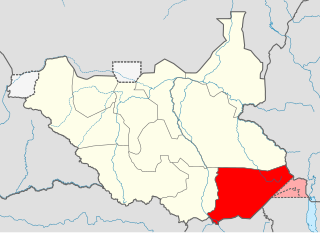
Equatoria is the southernmost region of South Sudan, along the upper reaches of the White Nile and the border between South Sudan and Uganda. Juba, the national capital and the largest city in South Sudan, is located in Equatoria. Originally a province of Anglo-Egyptian Sudan, it also contained most of northern parts of present-day Uganda, including Lake Albert and West Nile. It was an idealistic effort to create a model state in the interior of Africa that never consisted of more than a handful of adventurers and soldiers in isolated outposts.

Eastern Equatoria is a state in South Sudan. It has an area of 73,472 km2. The capital City is Torit. On October 1, 1972, the state was divided into Imatong and Namorunyang states and was re-established by a peace agreement signed on 22 February 2020.

Torit is a city of Eastern Equatoria State in South Sudan.

The Toposa are a Nilotic ethnic group in South Sudan, living in the Greater Kapoeta region of Eastern Equatoria state. They have traditionally lived by herding cattle, sheep and goats, and in the past were involved in the ivory trade. They have a tradition of constant low-level warfare, usually cattle raids, against their neighbors.
Paride Taban was a South Sudanese prelate of the Catholic Church and was the first leader of the Sudan Council of Churches, which was founded in February 1990. He was Auxiliary Bishop of Juba from 28 January 1980 to 2 July 1983 and served as Bishop of Torit from 1983 to 2004.

Magwi County, also Magwe County, is a county in Eastern Equatoria, South Sudan.

The Roman Catholic Archdiocese of Juba is the Metropolitan See for the ecclesiastical province of Juba in South Sudan.

Kapoeta is a town in South Sudan. It is located in Kapoeta South County, in Eastern Equatoria State, in southeastern South Sudan.

Torit County is an administrative region in Eastern Equatoria of South Sudan, with headquarters in the town of Torit, which is also the state capital.
Budi County is an administrative area of Eastern Equatoria state in South Sudan, with headquarters in Chukudum.

Namorunyang is a village and Payam of Kapoeta South County in Eastern Equatoria, South Sudan.

Kapoeta South County is an administrative region in Eastern Equatoria State. The county logo is a ram with horns and slightly bent tail. The county includes the Kapoeta Town, Machi and Namorunyang Payams.
Narus is a community in the Eastern Equatoria State of South Sudan. It is the headquarters of Kapoeta East County.

Kapoeta East County is an administrative region of Eastern Equatoria state in South Sudan, bordered by Kenya to the south, Ethiopia to the east and Jonglei state to the west. It is part of the Greater Kapoeta region of the state. The largest ethnic group is the Toposa people. The principal town is Narus. The county includes the disputed Ilemi triangle, controlled by Kenya. The emblem of the county is a horned bull, with big humps and a large tail.
Loyoro is a community in Eastern Equatoria state of South Sudan, about 50 kilometres (31 mi) as the crow flies to the north east of Narus. It lies on the Loyoro River. Loyoro is part of the Narus parish of the Catholic Diocese of Torit.
Lolim is a community located in Eastern Equatoria state of South Sudan. It is on the road from Kapoeta to Narus. Lolim lies just north of the Loyuro River, which has a pool called Lolimi. The community is mainly made up of Toposa people.
Nanyangacor is a community in Eastern Equatoria state of South Sudan. It is in the Eastern Uplands of Kapoeta East County, near the border with Ethiopia.
The Juba–Nimule Road is a road in South Sudan connecting the capital city of Juba in the Eastern Equatoria and the town of Nimule in Magwi County.
Kuron peace village is an intentional community founded by emeritus bishop Paride Taban in Kuron, South Sudan, in 2005. It is situated in Kapoeta East County, Namorunyang State, on the southeast border of South Sudan, roughly 190 km from Narus and 75 km from Boma. The area is mainly inhabited by the Toposa ethnic community of the Ateker ethnic cluster. Kuron peace village is situated near the Kuron river and close to the northern state boundary with Boma state. Its headquarters are based in Nanyangachor near the Ethiopian Highlands. the main aim of establishing the village was to have a village without tribalism









